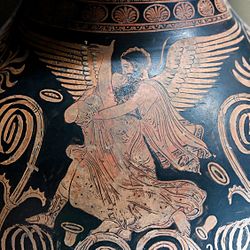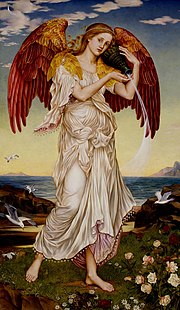
Io was a river goddess. Jupiter fell in love with the beautiful maiden, and one day, as she rested on the banks of the River, he changed his shape into that of a cloud, and embraced her. He whispered words of love to her, and then planted an immortal kiss upon her upturned cheek.
Now Jupiter's wife, the goddess Juno, was suspicious when she saw the cloud enveloping the Earth, for she noticed at the same time that her husband Jupiter was absent from Mt. Olympus. So Juno mounted her peacock drawn carriage and came to investigate. Jupiter quickly changed Io into a cow, hoping to conceal his romance with Io from his jealous wife. When Juno came upon the spot where Jupiter had only moments before been embracing Io, she saw only him and a beautiful cow. She immediately realized what had occurred, and said with sweet cunning, "Oh what a beautiful cow. Will you, mighty lord and master of all gods and men, give it to me as a gift." Jupiter was trapped. He could not deny Juno so simple a gift as a cow, yet he did not want to give away his girl friend Io. But in the end, Jupiter gave Juno the cow.
Juno immediately placed the cow under the watchful eyes of her trusted servant Argus. Now Argus had a hundred eyes, and only a few were ever closed at any one time. Thus Argus was able to watch over the cow Io constantly, without ever sleeping, for some eyes were always open. Jupiter was very sad, not only because Io was a cow, but because he could not visit with her without arousing jealousy in Juno. Finally, Jupiter sent his son Mercury to the site, with instructions that Mercury should sing and tell stories, and thereby lull Argus to sleep. So Mercury set out to fulfill his father's command, armed only with his syrinx, or musical pipes, and a head full of stories. Soon enough he found Argus sitting along the banks of the River Inachus, maintaining constant watch over Io, the heifer. After hearing him play on his pipes, Argus invited Mercury to sit awhile, and entertain him.
Mercury sat and played on the pipes, known as a syrinx, and told many stories. Finally he related the story of how the instrument he played upon was created. "Once upon a time, there was a beautiful water-goddess named Syrinx. She avoided young men and only kept company with the moon goddess Diana. Every day she attended to the needs of Diana, and followed her on the hunt. One day the god Pan met Syrinx in the woods, and fell in love with her. He told her how much he loved her, but Syrinx ran away if fear. Pan ran after her, for he wanted to hug her and kiss her. He overtook her on the bank of the river, and reached out to embrace her. She cried out for help from her companion water-goddess, and they responded by turning her into a clump of reeds at the moment of that Pan was about to kiss her. Pan sighed with disappointment when he saw that his beloved Syrinx had turned into a clump of reeds. Pan noticed that the air from his sigh passed through the clump of reeds, and made a beautiful sound. Pan then fashioned the reeds into a musical instrument which he named Syrinx, in honor of the young girl he had loved in vain." At this moment Mercury noted that Argus had fallen fast asleep.
When Mercury saw that Argus had fallen asleep, he reached for his sword, cut off the monster's head, and set Io free, although Io was still in the shape of a heifer. Juno took the eyes from the head of the slain Argus and placed them on the tail of her favorite bird, the peacock, where they remain to this day. And then Juno released a stinging fly to torment Io.
The legacy of the myth of Jupiter and Io includes names of seas, geographical passes, whole races of peoples, a moon of Jupiter, and a major feature on that moon.
Following the release of the stinging fly by Juno, Io swam across a body of water west of Greece, that was afterwards named the Ionian Sea to honor Io's passage. Io then passed over the narrow entrance to the Black Sea. The narrow entrance to the Black Sea is named the Bosporus, meaning "the fording of the ox," in honor of her passage. In the Caucusus she visited with the god Prometheus, who was also being unjustly punished, his crime being the theft of fire from heaven for the benefit of mankind. Finally, after Jupiter promised to no longer pursue Io, Juno released Io from her shape of a cow, and Io eventually settled in Egypt, becoming, according to legend, the first Queen of Egypt. After Galileo discovered the major moons of Jupiter in 1610, they were named for the mythological sweethearts of Jupiter, one of them, of course, being Io. And finally, when Voyager 1 passed Io in March 1979 and took a photo of the surface, the image showed the hoofprint of a heifer!
[FONT=Times New Roman, Times]
[/FONT]


























